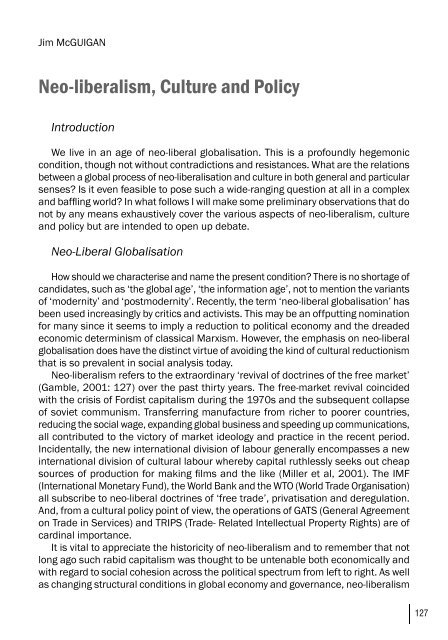art-e-conomy _ reader - marko stamenkovic
art-e-conomy _ reader - marko stamenkovic
art-e-conomy _ reader - marko stamenkovic
You also want an ePaper? Increase the reach of your titles
YUMPU automatically turns print PDFs into web optimized ePapers that Google loves.
Jim McGUIGAN<br />
Neo-liberalism, Culture and Policy<br />
Introduction<br />
We live in an age of neo-liberal globalisation. This is a profoundly hegemonic<br />
condition, though not without contradictions and resistances. What are the relations<br />
between a global process of neo-liberalisation and culture in both general and p<strong>art</strong>icular<br />
senses? Is it even feasible to pose such a wide-ranging question at all in a complex<br />
and baffling world? In what follows I will make some preliminary observations that do<br />
not by any means exhaustively cover the various aspects of neo-liberalism, culture<br />
and policy but are intended to open up debate.<br />
Neo-Liberal Globalisation<br />
How should we characterise and name the present condition? There is no shortage of<br />
candidates, such as ‘the global age’, ‘the information age’, not to mention the variants<br />
of ‘modernity’ and ‘postmodernity’. Recently, the term ‘neo-liberal globalisation’ has<br />
been used increasingly by critics and activists. This may be an offputting nomination<br />
for many since it seems to imply a reduction to political e<strong>conomy</strong> and the dreaded<br />
economic determinism of classical Marxism. However, the emphasis on neo-liberal<br />
globalisation does have the distinct virtue of avoiding the kind of cultural reductionism<br />
that is so prevalent in social analysis today.<br />
Neo-liberalism refers to the extraordinary ‘revival of doctrines of the free market’<br />
(Gamble, 2001: 127) over the past thirty years. The free-market revival coincided<br />
with the crisis of Fordist capitalism during the 1970s and the subsequent collapse<br />
of soviet communism. Transferring manufacture from richer to poorer countries,<br />
reducing the social wage, expanding global business and speeding up communications,<br />
all contributed to the victory of market ideology and practice in the recent period.<br />
Incidentally, the new international division of labour generally encompasses a new<br />
international division of cultural labour whereby capital ruthlessly seeks out cheap<br />
sources of production for making films and the like (Miller et al, 2001). The IMF<br />
(International Monetary Fund), the World Bank and the WTO (World Trade Organisation)<br />
all subscribe to neo-liberal doctrines of ‘free trade’, privatisation and deregulation.<br />
And, from a cultural policy point of view, the operations of GATS (General Agreement<br />
on Trade in Services) and TRIPS (Trade- Related Intellectual Property Rights) are of<br />
cardinal importance.<br />
It is vital to appreciate the historicity of neo-liberalism and to remember that not<br />
long ago such rabid capitalism was thought to be untenable both economically and<br />
with regard to social cohesion across the political spectrum from left to right. As well<br />
as changing structural conditions in global e<strong>conomy</strong> and governance, neo-liberalism<br />
127


